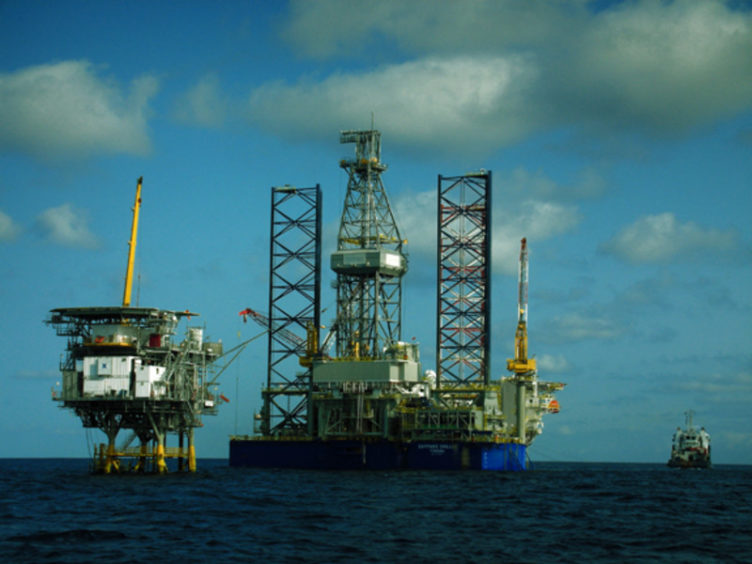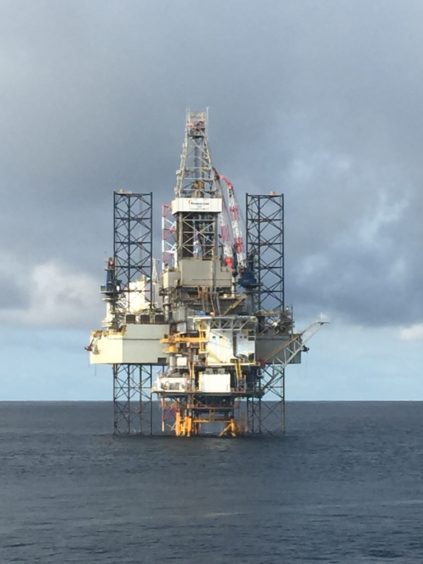
Vaalco Energy has completed the installation of new floating infrastructure off Gabon, shortly after completing its merger with TransGlobe Energy.
Vaalco delivered first oil to the Teli FSO on October 18, the company reported today. It carried out the last lifting from its FPSO on October 5.
Speaking to Energy Voice yesterday, CEO George Maxwell said the installation had been a “monumental task”.
The new FSO can store 50% more than the old FPSO, while reducing storage and offloading costs by 50%. As a result, the move to this new vessel should allow Vaalco to extend field life.
Maxwell took the reins at Vaalco in April 2021. His first priority had been to restructure the company’s Gabonese production, changing the FPSO for an FSO and driving an extended drilling programme.
Buyback
“The second part of the growth plan was looking at growth opportunities. We had spoken a few years earlier with TransGlobe,” Maxwell said, explaining that at the time both companies were working on licence extensions. “Those impediments have effectively gone away,” he said, “and most the heavy work had been done in due diligence terms.”
The appeal of a merger of two entities is that it does not require external financing, Maxwell said. While Vaalco did manage to complete its merger, two other such deals have fallen apart recently, with Capricorn Energy walking away from Tullow Oil and SDX Energy shareholders rejecting Tenaz Energy.
TransGlobe and Vaalco were a good fit when the deal was first announced, Maxwell said, and the “rationale just got stronger” as time passed. The deal diversifies risk and cash flows, while providing a stronger base in the capital market.
One symptom of this is the commitment to dividends. Vaalco stated last year that it would give a 4% yield, which would now provide a payment of around $30 million. Maxwell said the company was considering ways to boost this.
“The buyback opportunity is especially strong now,” he said, given the dilutive nature of the merger.
“We compete with all other industries for capital so we have to show a return. Where 4% was acceptable last year, there is pressure for that to grow as inflation reaches 8-9%. With more assets in production it’s easier to spread that burden.” It plans to return at least $60mn to shareholders in 2023.
Time to grow
The expansion into Egypt and Canada has no significant technical overlap, the CEO continued. The company expects to reduce administrative expenses but absorb country and technical support staff.
During the merger process, a TransGlobe shareholder called for the Canadian asset to be sold off.
“We’re not in the business of liquidation,” Maxwell said, “we’re in the business of growth and we’re not going to throw it away.”
Beyond its Gabon and TransGlobe moves, Vaalco is also pressing ahead with expansion into Equatorial Guinea.
In September, the company set out plans to develop the 15,000 barrel per day Venus project, targeting first oil in 2026.
Maxwell said the aim of any oil company was to develop its reserves. “The objective is to get the barrels out of the ground,” he said.
The executive said he had challenged his technical team to provide a cost effective development and the project was set to come in at $13 per barrel finding and development.
The executive acknowledged inflation was driving up costs but was relaxed around Venus. “We can control two things, volumes and costs. Strategy comes after,” he said.
“We can never be complacent about costs but we can control a lot of that through effective planning.”
Beyond Venus, there is also a “huge exploration prospect” on Block P, the CEO said. Securing production and cash flow from Venus and Saturno would go a way to making the case for exploration.
Vaalco did run into some problems from its partner on Block P over its Venus project. Nigeria’s Atlas Petroleum issued an objection to the plan.
Maxwell said that he had held talks with Atlas’ owner Prince Arthur Eze last week. “I see opportunities to continue and grow with Atlas,” he said.


